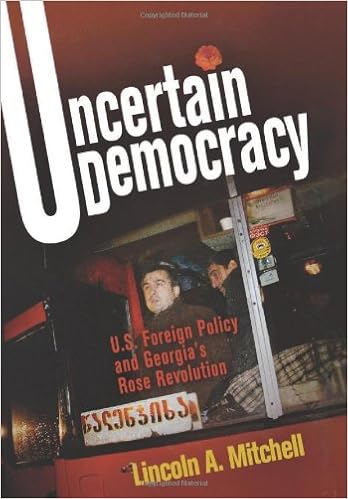 After more than a decade of turmoil and decline, Georgia has emerged as one of the world’s most dynamic laboratories of democracy 다운로드. The major event in this new chapter of its history is the “Rose Revolution.” A three week period of political intrigue and public demonstrations in November 2003 led to Eduard Shevardnadze’s resignation, and the result was that a demoralized and lethargic society suddenly seemed to turn into an energetic experiment in democracy 다운로드. Events subsequent to the Rose Revolution suggest that this may be just the beginning of a larger transition, but regardless of where the future leads, this bloodless rebellion will remain a fascinating chapter in its own right 다운로드. It has left a powerful impression not only on Georgians, but on people throughout the world. Admired by some and deplored by others, it has been observed closely everywhere in the former Soviet states and beyond 다운로드. This new book presents a first historical snapshot of the Rose Revolution and events leading up to it. The editors have included interviews with major players who were at the center of this historical episode as well as chapters by analysts who have tried to make sense of it from various perspectives 다운로드. The result is a multifaceted picture of an exciting, as well as perilous time.
After more than a decade of turmoil and decline, Georgia has emerged as one of the world’s most dynamic laboratories of democracy 다운로드. The major event in this new chapter of its history is the “Rose Revolution.” A three week period of political intrigue and public demonstrations in November 2003 led to Eduard Shevardnadze’s resignation, and the result was that a demoralized and lethargic society suddenly seemed to turn into an energetic experiment in democracy 다운로드. Events subsequent to the Rose Revolution suggest that this may be just the beginning of a larger transition, but regardless of where the future leads, this bloodless rebellion will remain a fascinating chapter in its own right 다운로드. It has left a powerful impression not only on Georgians, but on people throughout the world. Admired by some and deplored by others, it has been observed closely everywhere in the former Soviet states and beyond 다운로드. This new book presents a first historical snapshot of the Rose Revolution and events leading up to it. The editors have included interviews with major players who were at the center of this historical episode as well as chapters by analysts who have tried to make sense of it from various perspectives 다운로드. The result is a multifaceted picture of an exciting, as well as perilous time.
Karumidze, Z., & Wertsch, J. V 다운로드. (Eds.). (2005). ” Enough!”: The Rose Revolution in the Republic of Georgia 2003. Nova Science Publishers.
See on books.google.com; Review (Christoph H 코난 감청의 권 자막 다운로드. Stefes, Totalitarismus und Demokratie)

 This is the first comprehensive cultural and historical introduction to modern Georgia
This is the first comprehensive cultural and historical introduction to modern Georgia  From late 2003 through mid-2005, a series of peaceful street protests toppled corrupt and undemocratic regimes in Georgia, Ukraine, and Kyrgyzstan and ushered in the election of new presidents in all three nations
From late 2003 through mid-2005, a series of peaceful street protests toppled corrupt and undemocratic regimes in Georgia, Ukraine, and Kyrgyzstan and ushered in the election of new presidents in all three nations  In November of 2003, a stolen election in the former Soviet republic of Georgia led to protests and the eventual resignation of President Eduard Shevardnadze
In November of 2003, a stolen election in the former Soviet republic of Georgia led to protests and the eventual resignation of President Eduard Shevardnadze  After working for Time magazine in London, Wendell Steavenson spent two years in the former Soviet republic of Georgia
After working for Time magazine in London, Wendell Steavenson spent two years in the former Soviet republic of Georgia